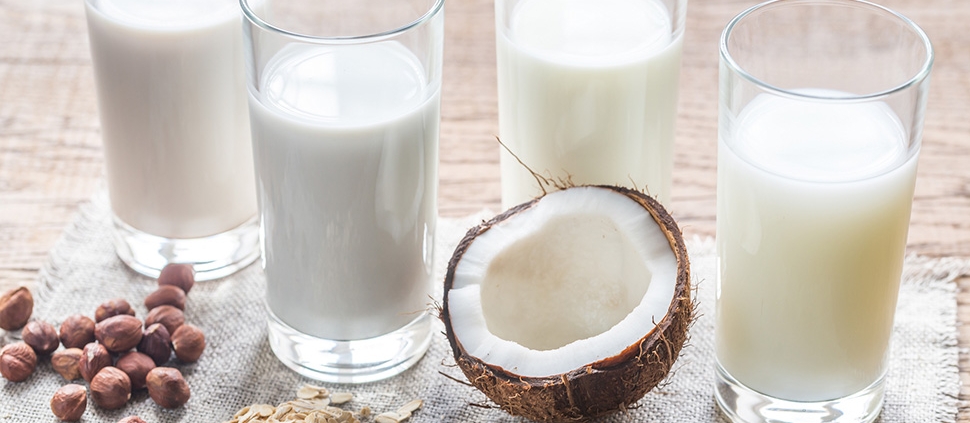What Kind of Milk Should I be Drinking?
Whole milk, 2%, Almond milk, coconut milk, rice milk, cashew milk, oat milk, hemp milk, or a combination of all of these?
As far as variety and options go, we’re living in a time when we have a million different choices to make every time we go to the grocery store. Many people are prioritizing their health and stores have risen up to the challenge and provided us with endless brands and types of milks. This is so evident when you go to the milk section and almost have to spend as much time reading labels as you do watching your favorite show or taking a leisurely walk in the park. It can be time consuming!
What are some key things you should be looking for when you navigate the milk section/ plant based milk section of the grocery store? Are these milks really healthy? Or did some companies just jump on the health food craze and provide a product that appears to be the healthier option but has ingredients in it that you can’t recognize that may be harmful to you? Let’s break it down into simple things to look for on the nutrition label so that you can navigate what milk options are best for your family.
Whether you are choosing a traditional milk or a plant based milk, here are a few things to look for and avoid:
Carrageenan: this is an inflammatory additive that should be avoided.
Natural flavors: there is nothing natural about these! Companies are allowed to hide all sorts of ingredients under this label. Until they are told to be specific about their ingredients, it is best to avoid anything with “natural flavors” in the ingredients list.
Soy: Many varieties of soy are GMO and can be very inflammatory. Unless the soy is organic, leave it on the shelf!
Sugar: pay attention to the sugar content of some plant based milks. Sometimes the “original and “vanilla” flavored milks have sugar added. Usually these same brands will have an “unsweetened” version right next to them, grab that instead!
Conventional cow’s milk: If you’re buying milk from a cow, an additional step is needed to figure out the ingredients. When the ingredients label says “milk” you really have to dig a little deeper and think about everything that cow has eaten, because those things are also in the milk! Look for cow’s milk that is organic, grass fed, and hormone free. Traditionally processed cow’s milk comes from cows that are fed tons of antibiotics, hormones, corn wheat, and soy. If you have any allergies to these products, consider that your milk may contain these things as well, and search for cow’s milk that specifically mentions that the cows were not fed these things. (*note: if the label doesn’t mention that they avoid these things, they probably don’t!). With so many other healthy nutrient packed alternatives for cow’s milk, it is possible to avoid buying this all together.
Want to skip the grocery store processed milks and make it from scratch in your own kitchen? It’s so easy! Here’s my favorite recipe to make at home: all you need is a blender and a nut-milk bag or fine strainer.
Homemade coconut milk:
-Meat from one mature coconut + the coconut water or 1 cup of unsweetened coconut flakes
-4-6 cups hot water
-1 tsp vanilla
-2 tbsp sweetener of choice (honey, dates, maple syrup, or coconut sugar)
-1 pinch of salt
Instructions: Choose a mature (not young) coconut that has meat in it. These are the ones in the grocery store that have the husk removed already and are light brown on the outside. They are usually sold with a score around the outside to make them easier to crack open with a large knife or hammer. Dig out the meat, and place the meat and coconut water into the blender. (or you can substitute 1 cup of unsweetened coconut flakes) Add 4-6 cups of hot water and blend for a few minutes until the water has a nice white creamy consistency. (*tip, the hot water helps the fats from the coconut melt into the water for a creamier milk!) Once blended, pour the contents into a nut milk bag or fine strainer, and discard the pulp. Add 1 tsp vanilla, and 1-2 tbsp your choice of honey, maple syrup, or coconut sugar to sweeten to taste and a pinch of salt and blend again for a few seconds. Refrigerate and enjoy! Lasts about 4-7 days in the fridge.
Want to try another type of plant based milk like almond milk, cashew milk, hemp milk, oat milk, or rice milk? Just substitute 1 cup of your alternative ingredient into the hot water, and follow the same instructions (soaking your almonds or cashews overnight before blending)!
Making your own plant based coffee creamer? Just cut the water content in half, and add a few more tablespoons of a natural sugar, and a teaspoon more of vanilla. You can even spice it up with a teaspoon of cinnamon, or add cocoa powder… any variation you can think of to mix it up!
Making your own plant based milks from scratch lets you avoid all of the questionable ingredients from the store that you may find in pre-packaged milks, while delivering you all of the amazing health benefits from the vitamins and minerals of the fresh ingredients that you are using!
By just paying attention to a few key ingredients on the labels, we can bring our families health to a whole new level, easy as that! #gotmilk?



